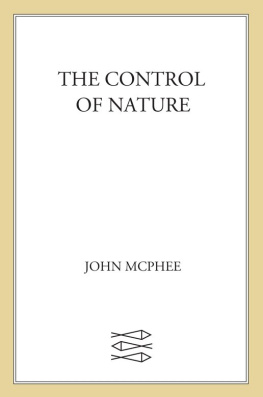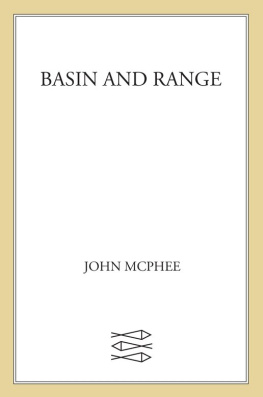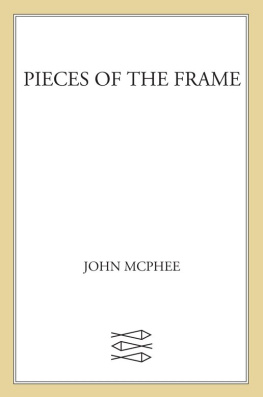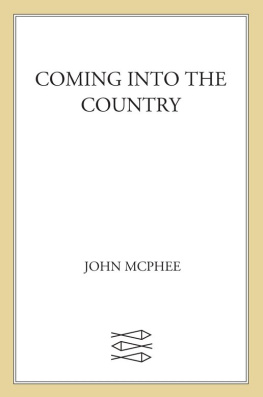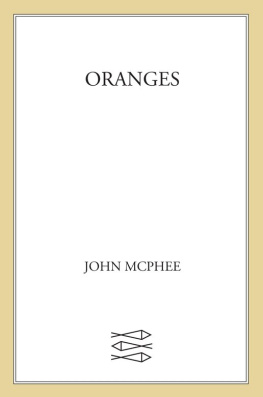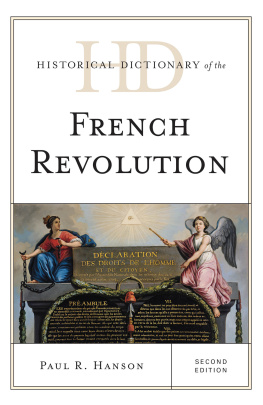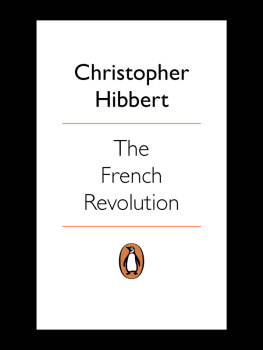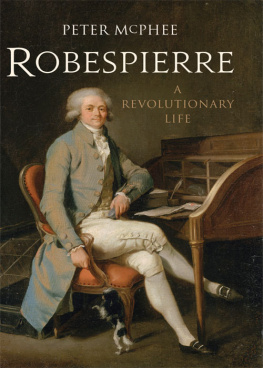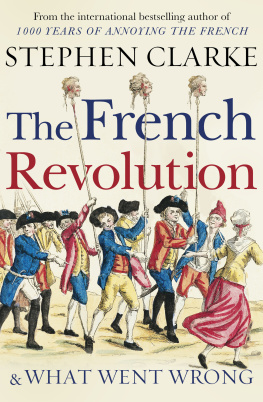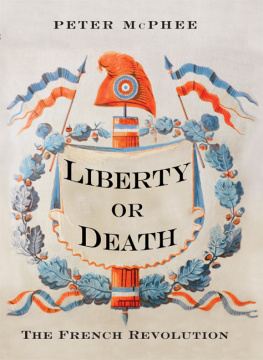McPhee - The French Revolution, 1789-1799
Here you can read online McPhee - The French Revolution, 1789-1799 full text of the book (entire story) in english for free. Download pdf and epub, get meaning, cover and reviews about this ebook. City: New York;France;Oxford England, year: 2002, publisher: Oxford University Press USA - OSO, genre: Art. Description of the work, (preface) as well as reviews are available. Best literature library LitArk.com created for fans of good reading and offers a wide selection of genres:
Romance novel
Science fiction
Adventure
Detective
Science
History
Home and family
Prose
Art
Politics
Computer
Non-fiction
Religion
Business
Children
Humor
Choose a favorite category and find really read worthwhile books. Enjoy immersion in the world of imagination, feel the emotions of the characters or learn something new for yourself, make an fascinating discovery.

The French Revolution, 1789-1799: summary, description and annotation
We offer to read an annotation, description, summary or preface (depends on what the author of the book "The French Revolution, 1789-1799" wrote himself). If you haven't found the necessary information about the book — write in the comments, we will try to find it.
The French Revolution, 1789-1799 — read online for free the complete book (whole text) full work
Below is the text of the book, divided by pages. System saving the place of the last page read, allows you to conveniently read the book "The French Revolution, 1789-1799" online for free, without having to search again every time where you left off. Put a bookmark, and you can go to the page where you finished reading at any time.
Font size:
Interval:
Bookmark:
The French Revolution 17891799
Peter McPhee


Great Clarendon Street, Oxford OX2 6DP
Oxford University Press is a department of the University of Oxford.
It furthers the Universitys objective of excellence in research, scholarship,
and education by publishing worldwide in
Oxford New York
Athens Auckland Bangkok Bogot Buenos Aires Cape Town
Chennai Dar es Salaam Delhi Florence Hong Kong Istanbul Karachi
Kolkata Kuala Lumpur Madrid Melbourne Mexico City Mumbai Nairobi
Paris So Paulo Shanghai Singapore Taipei Tokyo Toronto Warsaw with associated companies in Berlin Ibadan
Oxford is a registered trade mark of Oxford University Press
in the UK and in certain other countries
Published in the United States
by Oxford University Press Inc., New York
Peter McPhee 2002
The moral rights of the author have been asserted
Database right Oxford University Press (maker)
First published 2002
All rights reserved. No part of this publication may be reproduced,
stored in a retrieval system, or transmitted, in any form or by any means,
without the prior permission in writing of Oxford University Press,
or as expressly permitted by law, or under terms agreed with the appropriate
reprographics rights organizations. Enquiries concerning reproduction
outside the scope of the above should be sent to the Rights Department,
Oxford University Press, at the address above
You must not circulate this book in any other binding or cover
and you must impose this same condition on any acquirer
British Library Cataloguing in Publication Data
Data available
Library of Congress Cataloging in Publication Data
Data available
ISBN 0199244146
10 9 8 7 6 5 4 3 2 1
Typeset in Stone Serif and Stone Sans
by RefineCatch Limited, Bungay, Suffolk
Printed in Great Britain by
T. J. International Ltd., Padstow, Cornwall
The French Revolution is one of the great turning-points in history. Never before had the people of a large and populous country sought to remake their society on the basis of the principle of popular sovereignty. The drama, success, and tragedy of their project, and of the attempts to arrest or reverse it, has attracted students to it for more than two centuries. Although right-wing journalists at the time of the bicentenary of 1989 rushed to proclaim that the French Revolution is finished, its importance and fascination for us are undiminished.
Ever since several thousand armed Parisians seized the Bastille fortress in Paris on 14 July 1789 people have debated the origins and meaning of what had happened. All have agreed on the unprecedented and momentous nature of the storming of the Bastille and associated acts of revolution in the months between May and October 1789. However, such were the consequences of these events that the debate on their origins shows no signs of concluding.
In the years after 1789 successive revolutionary governments sought to remake every aspect of life in accordance with what they understood to be the principles underpinning the Revolution of 1789. However, because there could not be agreement on the practical application of those principles, the question of whose revolution this was quickly became a source of division, driving the Revolution in new directions. At the same time, powerful opponents of change inside and outside France forced governments to take measures to preserve the Revolution itself, culminating in the Terror of 17934.
Those in power during these years repeatedly asserted that the Revolution, having achieved its objectives, was over, and that stability was the order of the day. When Louis XVI entered Paris in October 1789; when the National Assembly resolved to disperse by force a crowd of petitioners calling for the kings overthrow in July 1791; when the National Convention introduced the Constitution of the Year III in 1795each time it was asserted that the time had come to stop the process of revolutionary change. In the end, it was Napoleon Bonapartes seizure of power in December 1799 which was the most successful of such attempts to impose stability.
The first historians of the Revolution had by then begun to outline not only their narratives of these years but also their judgements about the consequences of revolutionary change. How revolutionary was the French Revolution? Did the protracted political instability of these years disguise a more fundamental social and economic stability? Was the French Revolution a major turning-point in French, even world, history, as its proponents claim, or a protracted period of violent upheaval and warfare which wrecked millions of lives?
This book is a narrative history of the Revolution which also seeks to answer the fundamental questions outlined above. Why was there a Revolution in 1789? Why did it prove so difficult to stabilize the new regime? How might the Terror be explained? What were the consequences of a decade of revolutionary change? The book draws on the great richness of historical writing of the past few decades, some of it part of the renewed debates at the time of the bicentenary of the Revolution in 1789, but much of it influenced by wider changes in approaches to the writing of history.
Four themes stand out among the rich diversity of approaches to the French Revolution in recent years. The first has applied a more imaginative understanding of the world of politics by placing the practice of power within the context of political culture and the public sphere. That is, this approach contends that we can begin to understand the French Revolution only by going beyond the court and parliament to consider a fuller array of ways in which people thought about and acted out politics. Linked to this is a second approach which has examined the masculine domination of institutional politics and the aggressive response to womens challenges to mens power. As a corollary, a third approach has been to reopen debates on the origins of the Terror of 17934: are the seeds of the deadly and repressive politics of that year to be found in the earliest moments of the Revolution, in 1789 itself, or was the Terror a direct response to the desperate military crisis of 1793? Finally, and rather differently, a renewed interest in the experience of ordinary people has enabled historians to consider more broadly the rural experience of revolution. One dimension of that experience which will be highlighted here concerns the history of the rural environment.
The decade of the French Revolution was significant, too, for the elaboration of some major statements of political ideas or ideologies, such as the Declaration of the Rights of Man and of the Citizen in 1789 and the Jacobin Constitution of 1793. Contemporary descriptions of some of the most harrowing episodes of the Revolution, such as the September Massacres in 1792, are unusually powerful. For that reason, key sections of a wide array of documents are reproduced here, the better to enable us to listen to the diverse voices of revolutionary France.
My colleague Chips Sowerwine has given the manuscript the benefit of his critical and knowledgeable gaze: I am grateful to him for that, as I am for his friendship and encouragement. The manuscript has also been improved by a critical reading by Charlotte Allen, Judy Anderson, Glenn Matthews, Tim Tackett, and Suzy Schmitz; none of them, of course, is responsible for the books shortcomings. Further valuable assistance was provided by Juliet Flesch, Marcia Gilchrist, and Kate Mustafa.
Next pageFont size:
Interval:
Bookmark:
Similar books «The French Revolution, 1789-1799»
Look at similar books to The French Revolution, 1789-1799. We have selected literature similar in name and meaning in the hope of providing readers with more options to find new, interesting, not yet read works.
Discussion, reviews of the book The French Revolution, 1789-1799 and just readers' own opinions. Leave your comments, write what you think about the work, its meaning or the main characters. Specify what exactly you liked and what you didn't like, and why you think so.

